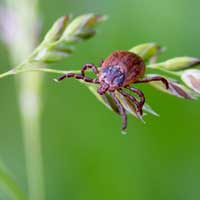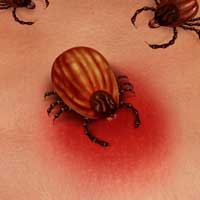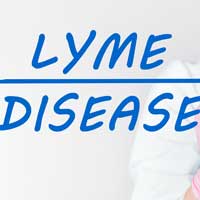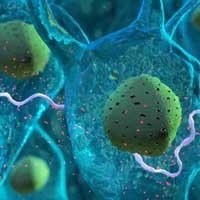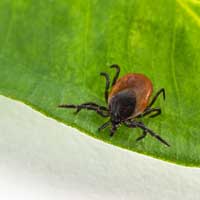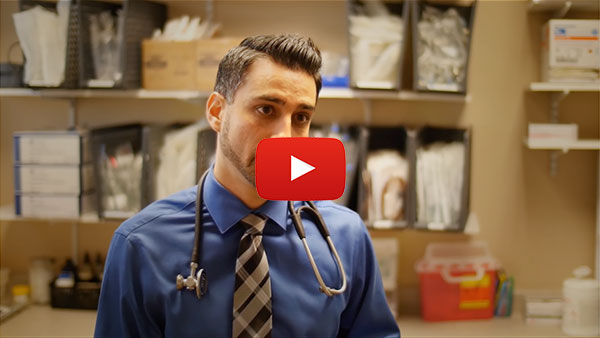Rocky Mountain Spotted Fever (RMSF) and Lyme Disease: Exploring the Connection

The bright and sunny summer months, which are best suited for outdoor activities, are often harbingers of several tickborne diseases, such as Rocky Mountain Spotted Fever (RMSF) and Lyme disease. Both diseases are caused by tick bites, and they may have similar symptoms at the onset, but they are two distinctly different diseases which can lead to life-threatening conditions and hospitalizations. In fact, according to the Centers for Disease Control and Prevention (CDC), RMSF is one of the deadliest tickborne diseases in the Americas.
Similarities Between Rocky Mountain Spotted Fever and Lyme Disease
- Both are bacteria based infectious diseases caused by infected ticks biting humans.
- Both have similar initial symptoms, such as fever, muscle pain, severe headache, and joint pains.
- Most healthcare providers may encounter challenges in diagnosing both these diseases, due to the lack of accuracy in standard laboratory tests.
Differences Between Rocky Mountain Spotted Fever and Lyme Disease
- Rocky Mountain Spotted Fever
-
- Caused by the bacteria Rickettsia Rickettsii, also known as r.rickettsii
-
- This bacterium is carried by the American dog tick (Dermacentor variabilis), Rocky Mountain wood tick (Dermacentor andersoni), and the brown dog tick (Rhipicephalus sanguineus)
-
- Characterized by rashes which look like small, bright red petechial (spotted) lesions
-
- Increased incidence during summer months
- Lyme Disease
-
- Caused by the bacteria Borrelia burgdorferi, also known as b.burgdorferi
-
- This bacterium is carried by the deer tick (Ixodes scapularis)
-
- Characterized by the typical bulls-eye rash, known as erythema migrans
-
- Incidence is not time bound, as the bacteria b.burgdorferi may manifest symptoms years after tick bite
How Lyme Disease and Rocky Mountain Spotted Fever Can Coexist
The similarity in the epidemiology of both the diseases increases the chances of RMSF being a co-infection associated with Chronic Lyme Disease Complex. According to a 2015 study by Envita Medical Centers, a world-class center of excellence for Lyme disease treatment, diseases like RMSF, ehrlichiosis, anaplasmosis, babesiosis, and tularemia, which are harbored by tick bites, may be potential co-infections of Lyme disease. In fact, the CDC states that certain rickettsia like bacteria, such as ehrlichia can be transmitted to humans through the bite of either an infected lone star tick (Amblyomma americanum) or the Lyme disease carrier deer tick (Ixodes scapularis).
Disclaimer: Individual results will vary. Envita makes no guarantees for outcomes. Each patient case is unique. Please consult your doctor before making any changes to your medical treatment. Not every patient is a candidate for care or achieves these results. Treatments used in this case may not all be FDA approved for the treatment of this condition.
In their clinical experience of over 25 years, the expert team of Lyme Literate Doctors at Envita Medical Centers have treated thousands of patients with aggravated conditions due to multiple co-infections like RMSF, ehrlichiosis, anaplasmosis, babesiosis, and tularemia. All these conditions may either co-exist in combinations, manifest along with Lyme disease, or exist independently, but they need early diagnosis and timely medical intervention to avoid aggravation of disease.
According to a medical study published in the Open Journal of Medical Microbiology, the window of conventional treatment for Lyme disease is extremely short. The bacteria's ability to evade the immune system and because its symptoms mimic multiple other diseases makes its diagnosis and treatment difficult for standard healthcare providers, with limited knowledge of this disease.
Many of the cases of RMSF had been earlier misdiagnosed by inexperienced doctors as meningitis and encephalitis due to symptoms like headache and fever, while the abdominal pain associated with RMSF has been mistaken for appendicitis, cholecystitis, or gastroenteritis. To avoid such complications, the expert team at Envita Medical Centers utilizes proprietary Next-Generation DNA Sequencing laboratory testing which paves the way for comprehensive treatment and holistic recovery.
Challenges in Diagnosis of RMSF and Lyme Disease
Standard diagnostic tests for RMSF and Lyme disease include serology, Polymerase chain reaction (PCR) amplification, ELISA, and Western Blot tests, which may not always reflect accurate results, delaying diagnosis. According to the CDC's Morbidity and Mortality Weekly Report (MMWR) on RMSF, delays in diagnosis and treatment make it the most frequently fatal rickettsial illness
The standard serologic test for the diagnosis of RMSF is the indirect immunofluorescence antibody (IFA) assay for immunoglobulin G (IgG) using R. rickettsii antigen. However, medical studies highlight that serum antibodies to Rickettsia causing RMSF may not be positive for 7-10 days into the illness, and therefore serology testing may be negative when the patients present early in the course of the illness.
Even the ELISA and Western Blot tests for Lyme disease may not be accurate as these tests are based on the detection of antibodies for the Lyme causing bacteria b.burgdorferi, and if a patient's immune system is too weak to produce the antibodies then the Lyme disease can go undetected. These false negative results lead to disease progression, as the bacteria penetrates through the blood brain barrier and affects the patient's central nervous system. In such cases, patients may experience symptoms like seizures, brain fog, word block, and memory loss.
How to Overcome Standard Diagnostic Challenges
According to a recent scientific research, Next-Generation DNA Sequencing (NGS) utilizing bioinformatics is the right technology needed for many clinicians searching for more accurate and efficient ways to identify the etiology of their difficult-to-diagnose patients with unknown or complex infectious diseases. Envita Medical Centers uses this technology for their proprietary PathoDNA test which has the potential to directly measure the amount of infectious disease related DNA in a blood or urine sample, instead of relying on the immune system to produce antibodies for appropriate disease detection. This hypothesis-free testing can drastically speed up the diagnosis process for physicians since there would not be a need to test for each potential infection individually or wait for results before submitting subsequent tests.
New Treatments Integrating the Benefits of Antibiotics With Natural Medicines
Treatment with medicines like Doxycycline are recommended by the CDC for both RMSF and Lyme disease, however, antibiotic treatment alone may not be enough for patients with high infectious load. The co-existence of multiple infections often impacts the patient's immune system, hindering their ability to respond to antibiotics, which is why many patients continue to manifest symptoms despite undergoing standard treatment.
To help patients recover holistically, Envita utilizes a powerful blend of antibiotics and natural medicines, which are custom-made at their in-house pharmacy. These patient-specific medications allow Envita's expert team to potentiate treatment benefits by not only targeting the unique infectious load of each individual patient but also bolstering their immune system.
The Lyme-Literate Physician team at Envita Medical Centers also utilizes proprietary treatments like IRAD (Insulin Receptor Antibiotic Delivery), which is especially helpful in complicated cases of Lyme disease and other coinfections like RMSF, when the bacteria has penetrated the blood brain barrier. Here are some of the benefits of IRAD:
- It overcomes the limitations of oral antibiotics, which are unable to impact the bacteria once it crosses the blood-brain barrier.
- Envita's IRAD is a deeper delivery of targeted antibiotics, patient-specific adjuvant immunotherapies, and customized natural medicines for the comprehensive treatment of neurological conditions attributed to Lyme disease and other chronic infections.
- IRAD helps shuttle antibiotics and Envita's personalized treatments past the blood brain barrier to directly impact the affected area and stimulate healing.
Preventive Steps
Early diagnosis and medical intervention are the best way to tackle tickborne diseases like RMSF and Lyme, for which there are no vaccines, but following a few preventive steps when engaging in outdoor activities may be optimal for keeping these diseases at bay. Here are some of the preventive measures:
- Be aware of tick habitats, which are grassy or wooded areas. Ticks may often latch on to your pets while dog walking, so check them and yourself every time you return home after walking your dog.
- Use products containing permethrin to treat clothing and boots to be used during outdoor activities like camping, trekking, gardening, and fishing.
- Wear covered clothes and socks to minimize skin exposure to ticks.
- Apply US EPA (United States Environmental Protection Agency) registered insect repellants containing DEET (N, N-Diethyl-meta-toluamide) to your skin and clothing for protection against ticks and fleas.
- Shower with warm water after you return home from grassy or wooded areas.
- After you return home, check for ticks on your body, and if you find one, carefully pull them out with tweezers. The earlier you pull them out, the lesser are your chances of getting infected by diseases.
Take a Tour of Envita Medical Centers
With tickborne diseases like Rocky Mountain Spotted Fever (RMSF) and Lyme disease, there are chances of disease progression and complications due to the lack of proper diagnosis and treatments. If you have any questions about Lyme disease or any other tick-borne disease, please don't hesitate to ask us. We have a dedicated team who can help answer any specific questions you may have as well as provide more in-depth educational material to help you make the right decisions when it comes to comprehensive treatment.
Choose Envita Medical Centers
Call NowOur team is ready to help you get your life back! Please enter your contact information and a Patient Care Expert will contact you shortly. If you would rather speak now, please give us a call at 866-830-4576.










